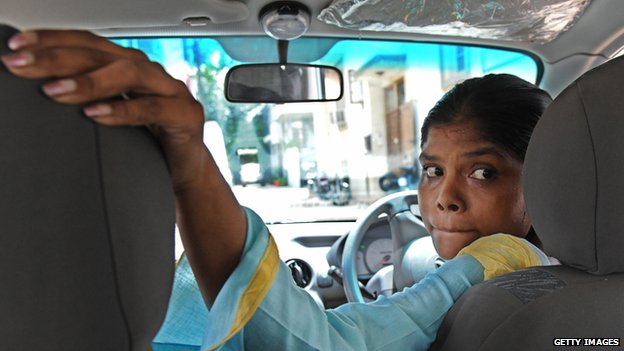The world of taxi drivers is dominated by men. But there is one small cab company in Delhi, where all the drivers and passengers are female. Women’s safety is a hot topic in India at the moment, so it’s proving a very popular service.

“When I’m on the road driving our cab I feel very proud, because this is a cab service for women, and I’m a woman,” says 31-year-old Shanti Sharma.
“Our work is supporting the women of Delhi. We’re giving them safety.”
Sharma is one of eight female drivers with a taxi service called Cabs for Women by Women.
The last couple of months, since the brutal rape and murder in the city of a student travelling on a bus, have been particularly busy for her and colleagues.
“After this case, our workload has increased so much,” says Sharma. “Women who used other cab services are also turning to us now.”
Most women in Delhi say they routinely face harassment, and worse, especially on public transport.
But life is not simple for the women cab drivers either. Some of them had not even been in a car before they were recruited, let alone driven one. They needed several months of training not only in how to drive and the rules of the road – but also first-aid and self-defence, just in case.
One of the drivers was attacked by an angry male cab driver as she was filling with up petrol. Another was assaulted by an affluent couple because she refused to reverse on a main street to make way for their car.
Sharma, a single parent with three daughters, has been working as a taxi driver since 2011, when the service was first set up, and it has changed her life. This is the first time that she has earned enough – about $250 (£160) a month – to support her family.
Of course, she and the other female taxi drivers are completely outnumbered by male cabbies.
“When I park somewhere, there are always men there and inevitably five or six of them get together and hang out,” she says.
“I’m usually the only woman in the parking lot, so I just stay inside the car… even one more woman driver would have been nice, to hang out with.”
It’s not much better when she is out on the road. Sharma says the male drivers give her a hard time.
“As soon as they see a girl at the wheel they start honking for no reason. They’ll try to overtake you. I’m always worrying about how to avoid getting hit by someone.”
Soon, I see what she means. At one point, as she prepares to make a U-turn, a few cars back up behind us.
The driver of a government jeep right behind starts honking persistently. It seems like the other drivers are staring at us – a woman driving a woman.
Sharma looks a little tense, but she laughs and shrugs it off.
“How can I turn if there is such heavy traffic in front, tell me? I don’t know what to say.”
The company behind Cabs for Women by Women, Sakha Consulting Wings, had a number of goals when it set up the service. With its partner, the Azad Foundation, it wanted to give women from a poor backgrounds an opportunity “to earn at par with the men,” says Nayantara Janardhan, Sakha’s chief operating officer.
But by putting women “in charge of technologies” – or at least motor cars – they also wanted to change attitudes, and open up boundaries for women, she says.
Sakha’s first venture of this kind was actually an all-women chauffeur service, which now employs about 50 drivers.
“There is this huge gender bias about women being bad drivers,” she says.
Many women who depended on male chauffeurs to ferry their kids back and forth between home, school and other activities admitted that they worried about their children’s safety – and yet, to begin with, they weren’t willing to try out women chauffeurs, says Janardhan.
So their first customers were friends and family. They were pleased with the service and news spread.
“As soon as we had seven drivers, we became a little more visible,” says Janardhan. And that gave the company courage to start the taxi service, which began with just one cab and two drivers.
“Everyone thought that having a women’s cab service in Delhi was not going to work,” she recalls. “But we thought, let us put it on the road and see what happens.”
Today, she’s waiting for the eighth cab to join the fleet. And in the last couple of months, since the death of the young student, she has received calls and emails from people all over the world offering to help Sakha grow. The number of customers is up too – by as much as 40%, she says.
Most are relatively affluent, independent women who need to travel alone a lot. Some are new to the city, or just passing through.
One of the firm’s first customers, was Praneeta Sukanya, aged 40, who works for an international charity, and often recommends the cabs to colleagues visiting from abroad.
“Many women coming to India for the first time have heard these horror stories and they don’t know anything about the city,” she says.
Sakha helps them to get out and see Delhi in safety.
But Sukanya also likes the way that the female cabbies – like their counterparts in Mumbai and Calcutta – are chipping away at stereotypical ideas about gender roles in Indian society.
“Little eddies of change are where it’s at,” she says.
“They’re blasting a huge myth about what women can and cannot do.”





